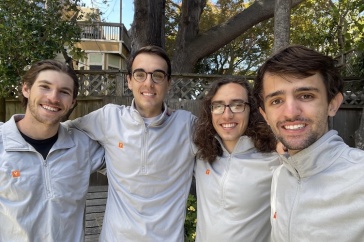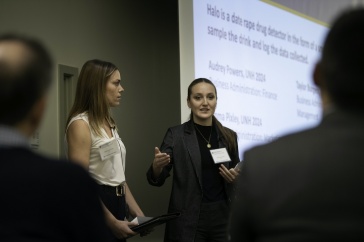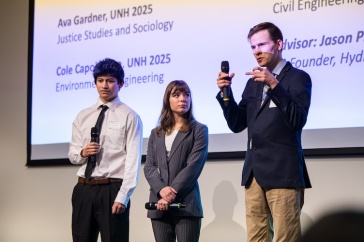
Tori Wyman ‘21
Did you know you would be majoring in business or economics? Had you planned on weaving in a focus on social innovation or sustainability?
When I was applying to school I applied into the business school, but what ultimately made my choice to come to UNH was the fact that it had so many other options and gave me the ability to change my mind and not feel like I had to be strictly business once coming here. At the time of applying, I had very little knowledge of the social innovation movement, other than my brother being an Environmental Science Major. I took a natural resources class as part of my degree requirements freshman year. It was during this class that I really learned about more than just the environment being at stake, and what being sustainable really meant. I didn’t get truly immersed into the importance of the movement until I applied to be a part of the B Impact Clinic, hoping to merge my two interests of business, and environmental conservation and sustainability, my newly adopted minor.
What social innovation or sustainability classes, programs or experiences have you been involved in and how did they challenge you to think differently about what a career in business or economics might be?
Having the experience to be a part of the first full semester of the B Impact Clinic gave me the opportunity to really learn with the group both leading and working on the projects, which set me up to have confidence and knowledge moving forward with the Changemaker Collaborative’s programs, formally named the Center for Social Innovation and Enterprise. This led me to my first internship the following summer, as part of the Social Innovation Summer Internship program, working with two non-profits, Reverb of Portland, Maine., and Concert Corps., of Manchester, N.H. These companies gave me the opportunity to work towards a greater mission and showed me the other side of the business world. Then this past semester and summer I had the opportunity to work with Piscatauqa Savings Bank, of Portsmouth, N.H., as part of the B Impact Clinic team, and then continued on as their social innovation Intern. This was my first time really going through the B Corp assessment by myself and trying to find advantageous solutions to not only raise the company’s score when they go to recertify next spring, but also as they look to better themselves as a company in the community. This experience really opened my eyes to the troubleshooting that goes along with the sustainability and socially innovative movements.
Moving forward when looking towards my future career, I want to be a part of a team that has the same drive as the students who are part of the Changemaker Collaborative. Having been a part of the programs has given me the network of students and faculty at UNH that care about doing better in the world, and I hope to find that in my future organization as well.
What do you aspire for in your career when you graduate from Paul College? How do you see what you have learned in regard to social innovation and sustainability playing into your career?
In my future career I hope to be employed by a Certified B Corp, or a company that instills similar values and mission into their everyday actions as a company. I hope that more companies become focused around social innovation and sustainability and it makes finding those organizations with a drive for the triple bottom line everyone’s mission. I aspire to be a part of an organization that is doing good for the world and has the motivation to promote the movement and expand, so that more companies see the good in what it means to be socially innovative and sustainable. I want the world to be more educated about what these types of companies stand for, and all companies to make it their mission to be better, because the people demand it.
Do business leaders have the power to change their communities and the world through socially responsible and sustainable actions, and how do they do that while still running competitive and profitable businesses?
I think leaders of business have the power to require more of their communities and the other companies they do business with. It is important to spend money with companies focused on changing the world. When choosing an ethical supply chain or where you do your banking, it is giving money to those companies who are sparking change and in turn will demand that more companies adapt to the change and be better. When large companies decide they care about where they are spending their money and investing, it gets more individuals involved and educated on innovative companies trying to better the world.
No matter what your career brings, do you think it is important for all business students to have some exposure to programming and education in social innovation and sustainability
I think it is very important that all students have exposure to education and programming in social innovation and sustainability. It may not change all of their minds about how they consume or how they act, but it could change a few or at least make people more aware and that is what matters. The more students exposed to this knowledge of socially innovative and sustainable companies can only help to further the goals and promotion of the movement.
-
Written By:
Sharon Keeler | Peter T. Paul College of Business and Economics | sharon.keeler@unh.edu | 6038623775



















































